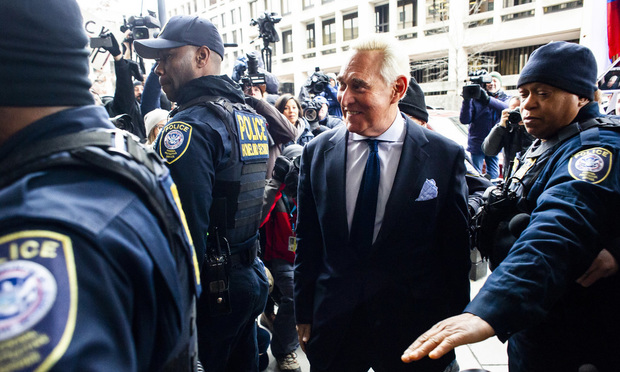Feds Ask for Up to 9 Years in Prison for Roger Stone, Citing 'Contempt for This Court'
"Stone's criminal conduct was not an act of desperation," prosecutors wrote. "Rather, his conduct was undertaken purposefully, by someone who knew exactly what he was doing."
February 10, 2020 at 06:38 PM
7 minute read
 Former Trump adviser Roger Stone arrives at federal court for his arraignment in Washington, D.C., on Tuesday, Jan. 29, 2019. Photo: Diego M. Radzinschi/ALM
Former Trump adviser Roger Stone arrives at federal court for his arraignment in Washington, D.C., on Tuesday, Jan. 29, 2019. Photo: Diego M. Radzinschi/ALM
Federal prosecutors are recommending that GOP political operative and longtime Trump associate Roger Stone be sentenced up to nine years in prison.
In a 26-page sentencing filing on Monday, prosecutors urged U.S. District Judge Amy Berman Jackson to sentence Stone "consistent with the applicable advisory guidelines," and their calculation placed that guideline in the range of nearly seven to nine years in prison.
"Roger Stone obstructed Congress's investigation into Russian interference in the 2016 election, lied under oath, and tampered with a witness. And when his crimes were revealed by the indictment in this case, he displayed contempt for this court and the rule of law," Monday's filing reads.
The attorneys from the U.S. Attorney's Office for the District of Columbia argued that Stone's conduct in relation to his crimes and after he was indicted merits a lengthier sentence than those given to others charged in relation to witness tampering, obstruction of justice or lying, citing Paul Manafort and Scooter Libby as examples.
"Stone's conduct over the past two years shows the low regard in which he holds the House Intelligence Committee's investigation and this very criminal case. That conduct suggests that a period of incarceration is warranted to achieve adequate deterrence," the filing reads.
"Stone's criminal conduct was not an act of desperation. He is a man of substantial means, and he has enjoyed a modicum of fame from his years of being a political advisor and confidant to powerful politicians, and from being an author and host of his own political radio show," prosecutors wrote. "Rather, his conduct was undertaken purposefully, by someone who knew exactly what he was doing."
The prosecutors also said that prison time will "deter others who intend to lie before Congress, obstruct a congressional proceeding, or tamper with a witness (or, in Stone's case, those who intend to commit all three criminal acts)."
"Such a sentence will also take into account Stone's conduct on pre-trial release, where he openly lied to this court about matters directly affecting the integrity of these proceedings," the filing continues.
The government attorneys also said that Stone's actions after his indictment "demonstrated the low regard in which he held these proceedings." They cited Stone's repeated violations of gag orders surrounding his case, and they accused Stone of communicating with InfoWars host Alex Jones ahead of the final day of his trial, quoting Jones as saying Stone told him to "ask for my pardon."
Stone's attorneys, in their own filing Monday, said their client does not require incarceration as a part of his sentence, especially when compared with what other people convicted in special counsel Robert Mueller's probe were sentenced to. Trump campaign chairman Paul Manafort was sentenced to 7.5 years in prison between his two separate convictions in Washington, D.C., and the Eastern District of Virginia for bank and tax fraud charges, and charges connected to his past lobbying work for Ukraine. Another high-profile target, Michael Cohen, was sentenced to 36 months in prison for making false statements to congress, and campaign finance and banking charges.
Alex Vanderzwann, a former Skadden, Arps, Slate, Meagher & Flom associate, was sentenced to 30 days in prison for lying to federal agents about his contacts with Trump campaign deputy chairman Rick Gates. Gates, who was a key witness against Manafort, was sentenced to 45 days in prison and three years of probation after pleading guilty to conspiracy and lying to federal investigators.
"When viewed in the context of the other defendants sentenced for similar offenses stemming from the same investigation, the need to avoid disparities between similarly situated defendants indicates the applicability of a non-Guidelines sentence in the instant matter," Stone's attorney's said.
Stone's is represented by a Fort Lauderdale-based team of attorneys, including Bruce Rogow and Robert Buschel.
A Washington, D.C., jury in November found Stone guilty of lying to Congress, impeding a congressional investigation and witness tampering.
Stone's sentencing is scheduled for Feb. 20. It was originally set for Feb. 6, but his attorneys requested a delay, saying he was having trouble collecting all the financial documents needed for probation officers.
Stone was charged with lying about who he claimed was his intermediary to WikiLeaks in the lead-up to the 2016 presidential election, as he suggested at the time he had prior information about Democratic email dumps by the group. He had told congressional investigators that the go-between was his longtime associate, Randy Credico.
But emails obtained by special counsel Robert Mueller's office showed the source of Stone's information was actually conspiracy theorist Jerome Corsi. Corsi said last year that Mueller prosecutors had threatened him with an indictment for lying to investigators, and he and his attorney Larry Klayman later unsuccessfully tried to sue Mueller in federal court.
Stone's charge of witness tampering was also in relation to Credico, who he urged to not testify to congressional investigators. Prosecutors also said Stone threatened Credico's dog. Credico acknowledged on the stand during the trial that Stone sent the messages, but said he didn't believe that Stone meant to hurt him or his dog, Bianca.
Some, including Credico, have written to Jackson, urging her not to sentence Stone to prison. In his letter to Jackson in January, Credico said his own father spent 10 years in prison and "the mental scars of those years never left my father's soul."
"I understand that Roger Stone has broken federal laws, but a prison sentence is beyond what is required in this case. It is not justice. It is cruelty," Credico wrote.
Stone maintained his innocence even before his indictment last year, as reports indicated Mueller was preparing to file charges against him. He repeatedly used social media to share the message "Roger Stone did nothing wrong," even selling shirts emblazoned with the phrase to help pay his legal bills.
Jackson issued a partial gag order against Stone at the start of the case, blocking him from talking about it while inside or near the federal courthouse in Washington, D.C.
But after he posted an image on Instagram depicting Jackson with a crosshair in the corner, the judge ordered him to stop discussing the case entirely. Federal prosecutors later accused Stone of violating the order through Instagram posts about court filings in his case, which led Jackson to further tighten the order and block him from posting anything on Facebook, Instagram or Twitter.
After the verdict was handed down in Stone's trial, prosecutor Jonathan Kravis urged Jackson to order Stone be taken into custody immediately, indicating that Stone may have passed information along through an intermediary that was then discussed on InfoWars, the conspiracy theory outlet Stone has worked for in the past.
Jackson declined to remand Stone. But in an order last week, she said both Stone's lawyers and federal prosecutors could address any violations of her gag order in their sentencing filings.
Stone was the final person to be indicted by Mueller before the special counsel probe shut down. Other ongoing inquiries begun by the special counsel were referred to other branches of the Department of Justice, leaving open the possibility that other Mueller-tied indictments could still be forthcoming.
Read the DOJ memo:
Read more:
Judge Amy Berman Jackson's Had a Front Row Seat for Mueller Cases
Roger Stone Is Guilty of All Counts, Says DC Jury
Roger Stone's Lawyers Offer Final Defense to Jurors: 'So What?'
This content has been archived. It is available through our partners, LexisNexis® and Bloomberg Law.
To view this content, please continue to their sites.
Not a Lexis Subscriber?
Subscribe Now
Not a Bloomberg Law Subscriber?
Subscribe Now
NOT FOR REPRINT
© 2025 ALM Global, LLC, All Rights Reserved. Request academic re-use from www.copyright.com. All other uses, submit a request to [email protected]. For more information visit Asset & Logo Licensing.
You Might Like
View All
In-House Moves of the Month: Boeing Loses Another Lawyer, HubSpot Legal Chief Out After 2 Years
5 minute read
After Regime Change, Syria Remains Liable in US Federal Courts for Alleged Assad-Era Terrorism Support
3 minute read

Split 4th Circuit Ruling Is a Win for Covington & Burling in US Army Base Attack Litigation
3 minute readTrending Stories
- 1Pro Hac Vice in Georgia: Rule Change for Nonresident Attorneys
- 2The Benefits of E-Filing for Affordable, Effortless and Equal Access to Justice
- 3AI and Social Media Fakes: Are You Protecting Your Brand?
- 4A Primer on Using Third-Party Depositions To Prove Your Case at Trial
- 5‘Catholic Charities v. Wisconsin Labor and Industry Review Commission’: Another Consequence of 'Hobby Lobby'?
Who Got The Work
J. Brugh Lower of Gibbons has entered an appearance for industrial equipment supplier Devco Corporation in a pending trademark infringement lawsuit. The suit, accusing the defendant of selling knock-off Graco products, was filed Dec. 18 in New Jersey District Court by Rivkin Radler on behalf of Graco Inc. and Graco Minnesota. The case, assigned to U.S. District Judge Zahid N. Quraishi, is 3:24-cv-11294, Graco Inc. et al v. Devco Corporation.
Who Got The Work
Rebecca Maller-Stein and Kent A. Yalowitz of Arnold & Porter Kaye Scholer have entered their appearances for Hanaco Venture Capital and its executives, Lior Prosor and David Frankel, in a pending securities lawsuit. The action, filed on Dec. 24 in New York Southern District Court by Zell, Aron & Co. on behalf of Goldeneye Advisors, accuses the defendants of negligently and fraudulently managing the plaintiff's $1 million investment. The case, assigned to U.S. District Judge Vernon S. Broderick, is 1:24-cv-09918, Goldeneye Advisors, LLC v. Hanaco Venture Capital, Ltd. et al.
Who Got The Work
Attorneys from A&O Shearman has stepped in as defense counsel for Toronto-Dominion Bank and other defendants in a pending securities class action. The suit, filed Dec. 11 in New York Southern District Court by Bleichmar Fonti & Auld, accuses the defendants of concealing the bank's 'pervasive' deficiencies in regards to its compliance with the Bank Secrecy Act and the quality of its anti-money laundering controls. The case, assigned to U.S. District Judge Arun Subramanian, is 1:24-cv-09445, Gonzalez v. The Toronto-Dominion Bank et al.
Who Got The Work
Crown Castle International, a Pennsylvania company providing shared communications infrastructure, has turned to Luke D. Wolf of Gordon Rees Scully Mansukhani to fend off a pending breach-of-contract lawsuit. The court action, filed Nov. 25 in Michigan Eastern District Court by Hooper Hathaway PC on behalf of The Town Residences LLC, accuses Crown Castle of failing to transfer approximately $30,000 in utility payments from T-Mobile in breach of a roof-top lease and assignment agreement. The case, assigned to U.S. District Judge Susan K. Declercq, is 2:24-cv-13131, The Town Residences LLC v. T-Mobile US, Inc. et al.
Who Got The Work
Wilfred P. Coronato and Daniel M. Schwartz of McCarter & English have stepped in as defense counsel to Electrolux Home Products Inc. in a pending product liability lawsuit. The court action, filed Nov. 26 in New York Eastern District Court by Poulos Lopiccolo PC and Nagel Rice LLP on behalf of David Stern, alleges that the defendant's refrigerators’ drawers and shelving repeatedly break and fall apart within months after purchase. The case, assigned to U.S. District Judge Joan M. Azrack, is 2:24-cv-08204, Stern v. Electrolux Home Products, Inc.
Featured Firms
Law Offices of Gary Martin Hays & Associates, P.C.
(470) 294-1674
Law Offices of Mark E. Salomone
(857) 444-6468
Smith & Hassler
(713) 739-1250










